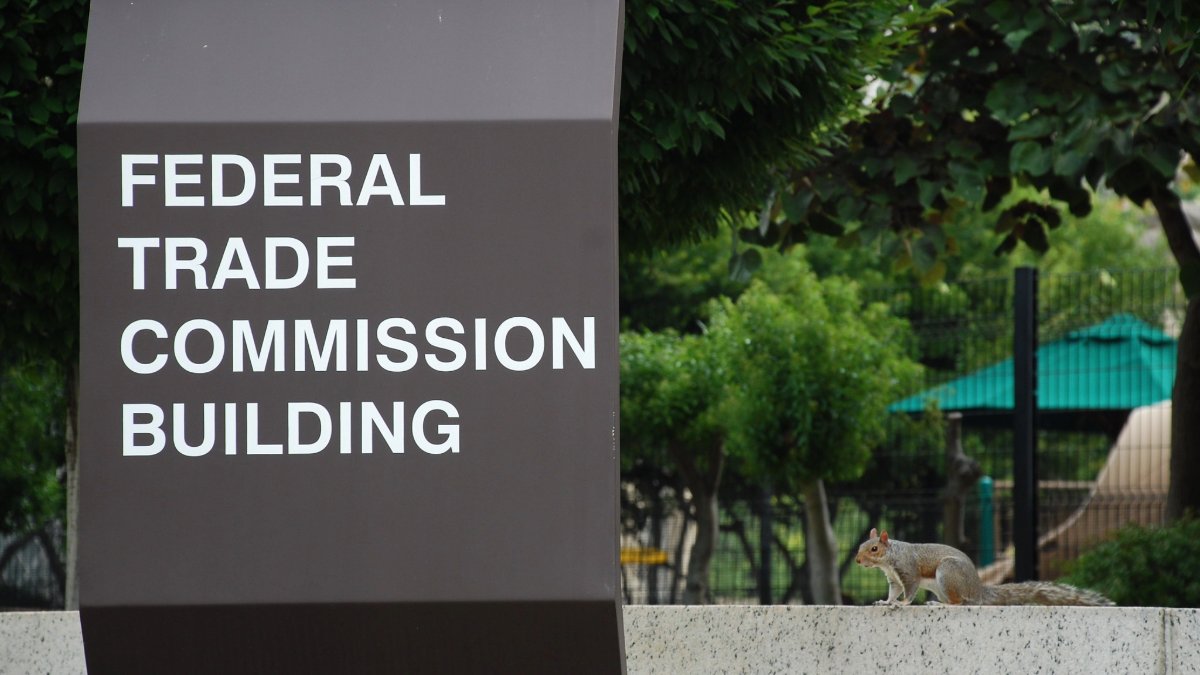December 2024 US Tech Policy Roundup
Rachel Lau, J.J. Tolentino, Ben Lennett, Prithvi Iyer / Jan 6, 2025
Sign at Federal Trade Commission building in Washington, DC (Adam Fagen, Flickr)
Rachel Lau and J.J. Tolentino work with leading public interest foundations and nonprofits on technology policy issues at Freedman Consulting, LLC. Ben Lennett is the managing editor of Tech Policy Press, and Prithvi Iyer is a program manager at Tech Policy Press.
December was a busy month for federal agencies and Congress, as officials worked to close out key debates and discussions ahead of the new Congress and Trump Administration in 2025. The House struggled to agree to a stopgap spending bill as Elon Musk and President-elect Trump rejected an initial proposal, eventually leading to a final compromise that stripped out several tech-related items. In contrast, the House Bipartisan AI Task Force released a report offering a blueprint for future AI legislation and oversight that was generally well-received by civil society.
As key Biden appointees at the Department of Justice (DOJ) and Federal Trade Commission (FTC) prepare to step down ahead of President-elect Trump’s January inauguration, both agencies took important actions to protect the public’s privacy. As part of settlement orders, the FTC banned two companies from collecting and selling sensitive location data. DOJ also issued a final rule to restrict the commercial sale and bulk transfer of Americans’ personal data and US Government-related data to Russia, Iran, China, and other countries.
In addition, the courts made several impactful decisions. The US Sixth Circuit Court of Appeals set aside the Federal Communication Commission’s (FCC) net neutrality rules, finding that the agency lacked the authority to regulate broadband services as common carriers. The decision was influenced by the Supreme Court’s reversal of the longstanding Chevron doctrine in Loper Bright Enterprises v. Raimondo over the summer. Finally, the Supreme Court agreed to an expedited review of the legislation requiring ByteDance to divest TikTok. The US Court of Appeals for the District of Columbia upheld the legislation earlier in the month, leading TikTok to appeal to the Supreme Court.
Read on to learn more about December developments in US tech policy.
Closing Out This Congress and The Biden Federal Government
Summary
As Congress closed out the year, lawmakers clashed in another contentious debate over the budget and debt ceiling. The Republican-led House Appropriations Committee introduced a stopgap spending bill to avoid a government shutdown on December 17, 2024. The bill included the Take it Down Act, which had passed the Senate in early December. That act required social media platforms to remove non-consensual intimate visual depictions, including digital forgeries or deepfakes, and imposed criminal penalties on individuals who published such content. The spending bill also included various House measures addressing the export of artificial intelligence technologies, rural broadband, and other tech issues such as cryptocurrency.
The day after the House introduced the spending bill, Elon Musk tweeted in opposition to it, as did President-elect Trump. In response, Speaker Mike Johnson (R-LA) introduced a second stopgap spending bill that removed several spending items in the original legislation and suspended the debt ceiling for two years. However, House Republicans failed to gather enough support to overcome the Democrats’ united opposition. A third stopgap spending bill was introduced on December 20, 2024, omitting the tech-focused actions included in the first version. It passed the House and Senate, and the President signed it on December 21.
Ahead of the incoming Trump Administration, federal agencies such as the Federal Trade Commission (FTC) also worked to conclude several privacy-related decisions. The FTC handed down decisions against data brokers Mobiwalla and Gravy Analytics in early December, ahead of Chair Lina Khan’s departure in January. Under the proposed settlement orders, the FTC banned both companies from collecting and selling sensitive location data. It is the first time the agency has taken this kind of action against companies that violated notice and consent requirements concerning data collection and use.
The Department of Justice (DOJ) also issued a final rule to restrict the commercial sale and bulk transfer of Americans’ personal data and U.S. Government-related data to Russia, Iran, China, and other countries. The rules are a product of Executive Order (E.O.) 14117, “Preventing Access to Americans’ Bulk Sensitive Personal Data and United States Government-Related Data by Countries of Concern.” The EO authorized the Department of Justice (DOJ) and other federal agencies to take steps to prevent “the large-scale transfer of Americans’ personal data to countries of concern.”
What We’re Reading
- Ali Breland, Elon Musk’s X Endgame, The Atlantic.
- Andrew Ross Sorkin et al., Who’s in Charge?, The New York Times.
- Cristiano Lima-Strong, FTC extends data broker crackdown as Khan’s term nears likely end, The Washington Post.
- Chase DiBenedetto, These 'countries of concern' can no longer buy Americans' sensitive data, Mashable.
House AI Task Force Releases an AI Policy Roadmap for Congress
Summary
The House’s Bipartisan AI Task Force released a comprehensive report that lays out a potential roadmap for Congress to develop AI-related legislation, Congressional oversight, and federal policy more generally. The report revealed findings from a months-long set of House task force meetings, with input from more than 100 stakeholders, including “technical experts, government offices, academics, legal scholars, and business leaders.” The report outlined recommendations concerning the use of AI in specific economic sectors, including education and the workforce, financial services, healthcare, national security, and more.
The report also provided guidance on relevant tech policy debates that intersect with AI, including data privacy, digital identity verification, and content copyright, among other issues. It also acknowledged the potential harms of AI use by governments, specifically related to civil rights and civil liberties. The AI Task Force intended for the report to serve as a blueprint for future legislation in various areas as sectors continue to work to harness the benefits of AI systems.
The 24-member Bipartisan House AI Task Force was established in February 2024 and tasked with exploring how “Congress can ensure America continues to lead the world in AI innovation while considering guardrails that may be appropriate to safeguard the nation against current and emerging threats.” Members of the task force were appointed by House Speaker Mike Johnson (R-LA) and House Minority Leader Hakeem Jeffries (D-NY), with Reps. Jay Obernolte (R-CA) and Ted Lieu (D-CA) serving as co-chairs. It remains unclear how the incoming Trump Administration will integrate the report’s findings into its own policy agenda; however, Rep. Obernolte confirmed that the task force has already met with the President-elect's transition team.
Stakeholder Response
In a joint letter accompanying the Task Force’s report, Reps. Obernolte and Lieu praised the work of the AI Task Force and reinforced that the report “encapsulates a targeted approach that balances the need to promote vibrant AI innovation while safeguarding Americans from potential harms.”
Responses to the report have been generally positive from both industry leaders and civil society. Daniel Castro, director of the Information Technology and Innovation Foundation, stated in a press release that the report offers an “actionable blueprint” for a bipartisan vision for AI governance that “balances innovation with safeguards and provides a credible framework lawmakers can stand behind.” In a recent LinkedIn post, OpenAI’s Chief Global Affairs Officer Chris Lehane showed appreciation for the report and emphasized OpenAI’s commitment to working with the next Congress and the Trump Administration to drive US leadership on AI. Adobe commended the AI Task Force in a recent post on X, stating that the report presents a “unique opportunity now to build on this foundation and set a smart course forward with AI policies that will secure America’s technological leadership.”
Damon T. Hewitt, president and executive director of the Lawyers’ Committee for Civil Rights Under Law, released a statement praising the AI Task Force’s report for highlighting Congress' efforts to ensure that AI doesn’t violate civil rights. Hewitt also urged Congress to take swift action and pass decisive legislation to protect the rights of communities most at risk of the potential harms of AI. Maya Wiley, president and CEO of The Leadership Conference on Civil and Human Rights, also released a statement acknowledging the report’s attempt to balance “the opportunities for our nation’s leadership in AI innovation while recognizing the critical need for guardrails that ensure that AI systems are fair and safe for everyone.” Wiley also pointed to notable gaps in the report, including a lack of “concrete measure to address potentially faulty AI” and a need for specifics to combat AI-generated disinformation.
What We’re Reading
- Prithvi Iyer and Justin Hendrix, “Reactions to the Bipartisan US House AI Task Force Report,” Tech Policy Press.
- Maria Curi, “What’s next for the House AI report,” Axios.
Tech TidBits & Bytes
Tech TidBits & Bytes aims to provide short updates on tech policy happenings across the executive branch and agencies, Congress, civil society, industry, international governance, and courts.
In the executive branch and agencies:
- The Department of Homeland Security (DHS) published an update to its AI Use Case Inventory, which documents 158 active AI use cases, including “39 safety- and/or rights-impacting use cases, 29 of which are deployed and 10 are pre-deployment as of December 16, 2024.”
- The White House published a blog post on “The Cost of Anticompetitive Pricing Algorithms in Rental Housing,” estimating that anti-competitive pricing algorithms cost renters $3.8 billion in 2023. The analysis also indicated that “if price coordination was eliminated, there would be an economically meaningful decrease in price mark-ups for rental units using pricing algorithms.”
- The Federal Trade Commission fined Grubhub for several unlawful practices, including “deceiving diners about delivery costs,” “deceiving workers about how much money they would make delivering food,” and “.... deceptively listing restaurants on its platform without their permission.”
- The National Telecommunications and Information Administration (NTIA) is seeking public input on ethical guidelines for researching online data or "pervasive data" to understand technology’s impact on society while protecting privacy and other rights. The request for comment (RFC) will close on January 15, 2025.
In Congress:
- The House Committee on the Judiciary and the Select Subcommittee on the Weaponization of the Federal Government published an interim staff report on “how and to what extent the executive branch has coerced or colluded with social media and technology companies and other intermediaries to censor lawful speech” through AI regulations. The report argued that the “burgeoning federal chokehold on AI innovation” threatens free speech.
In industry:
- One of the largest cyberattacks in US history came to light in December, with the Chinese government hacking organization Salt Typhoon accessing the systems of 80+ American and global telecom providers. Salt Typhoon tapped into the devices of top government officials and intelligence agencies, including President-elect Trump and Vice President-elect Vance. Sen. Marco Rubio (R-FL) called the hack “the most disturbing and widespread incursion into our telecommunications systems in the history of the world.”
In the courts:
- The US Sixth Circuit Court of Appeals set aside the Federal Communication Commission’s (FCC) 2024 Safeguarding and Securing the Open Internet order. The FCC order largely restored the 2015 net neutrality rules that were rescinded by the FCC under the chairmanship of Ajit Pai in 2017. The court ruled that the FCC lacks the statutory authority to regulate broadband providers as common carriers. The Supreme Court’s reversal of the longstanding Chevron doctrine in Loper Bright Enterprises v. Raimondo opened the door to the Sixth Circuit’s decision to interpret the FCC’s statutory authority to regulate broadband services.
- The US Court of Appeals for the District of Columbia upheld legislation requiring ByteDance to divest TikTok. In response, TikTok filed an emergency motion with the same court seeking an injunction pending the Supreme Court's likely review of the decision. The Court of Appeals denied TikTok's motion, leading the company to file an emergency application for injunction with the Supreme Court. The Supreme Court deferred the application for an injunction but granted an expedited review of the case. Civil society groups filed amicus briefs with the court on December 27, 2024, and an oral argument is scheduled for January 10, 2025.
- Parents filed another lawsuit against AI company C.AI. According to the complaint, one of C.AI’s AI avatars convinced a 17-year-old boy “that his parents were not doing anything for his health and safety and that the imposition of screentime limits – two hours of free-time each day – constituted serious and depraved child abuse." In addition, C.AI’s avatar pushed the young boy “to fight back, belittling him when he complained and, ultimately, suggesting that killing his parents might be a reasonable response to their rules."
Legislation Updates
The following bills were introduced across the House and Senate in December:
- Trustworthy by Design A.I. Act - S.5539. Introduced by Sen. Peter Welch (D-VT) and Sen. Ben Ray Lujan (D-NM), the bill “aims to address realistic, short-term challenges created by unregulated A.I. technologies by establishing best practice guidelines for all phases of A.I. development.”
- To require the Federal financial agencies… - H.R.10263 and S.5539. Introduced by Rep. Maxine Waters (D-CA) and Rep. Patrick McHenry (R-NC), the bill requires “financial regulators to carry out studies on the realized and potential benefits of artificial intelligence, and for other purposes.”
- A bill to impose sanctions with respect to foreign persons… - S.5571. Introduced by Sen Rick Scott (R-FL), the bill seeks to “impose sanctions with respect to foreign persons that knowingly engage in significant operations in the defense and related materiel sector or the surveillance technology sector of the economy of the People's Republic of China, and for other purposes.”
- Emerging Innovative Border Technologies Act - S.5407. Introduced by Sen Catherine Cortez Masto (D-NV), the bill requires the “Secretary of Homeland Security to develop a plan to identify, integrate, and deploy new, innovative, disruptive, or other emerging or advanced technologies that are safe and secure to enhance U.S. Customs and Border Protection's capabilities to meet its mission needs along international borders and at ports of entry.”
- A bill to direct the Secretary of Health and Human Services… - S.5567. Introduced by Sen Elizabeth Warren (D-MA), the bill directs the “Secretary of Health and Human Services to conduct a study to assess the unintended impacts on the health and safety of people engaged in transactional sex, in connection with the enactment of the Allow States and Victims to Fight Online Sex Trafficking Act of 2017 and the loss of interactive computer services that host information related to sexual exchange, to direct the Attorney General to submit a report on human trafficking investigations and prosecutions in connection with the same, and for other purposes.”
- A bill to direct the Secretary of Health and Human Services… - H.R.10455. Introduced by Robin Kelly (D-IL), the bill seeks to “direct the Secretary of Health and Human Services to establish the Health Sector Cybersecurity Coordination Center, and for other purposes.”
We welcome feedback on how this roundup could be most helpful in your work – please contact contributions@techpolicy.press with your thoughts.
Authors



